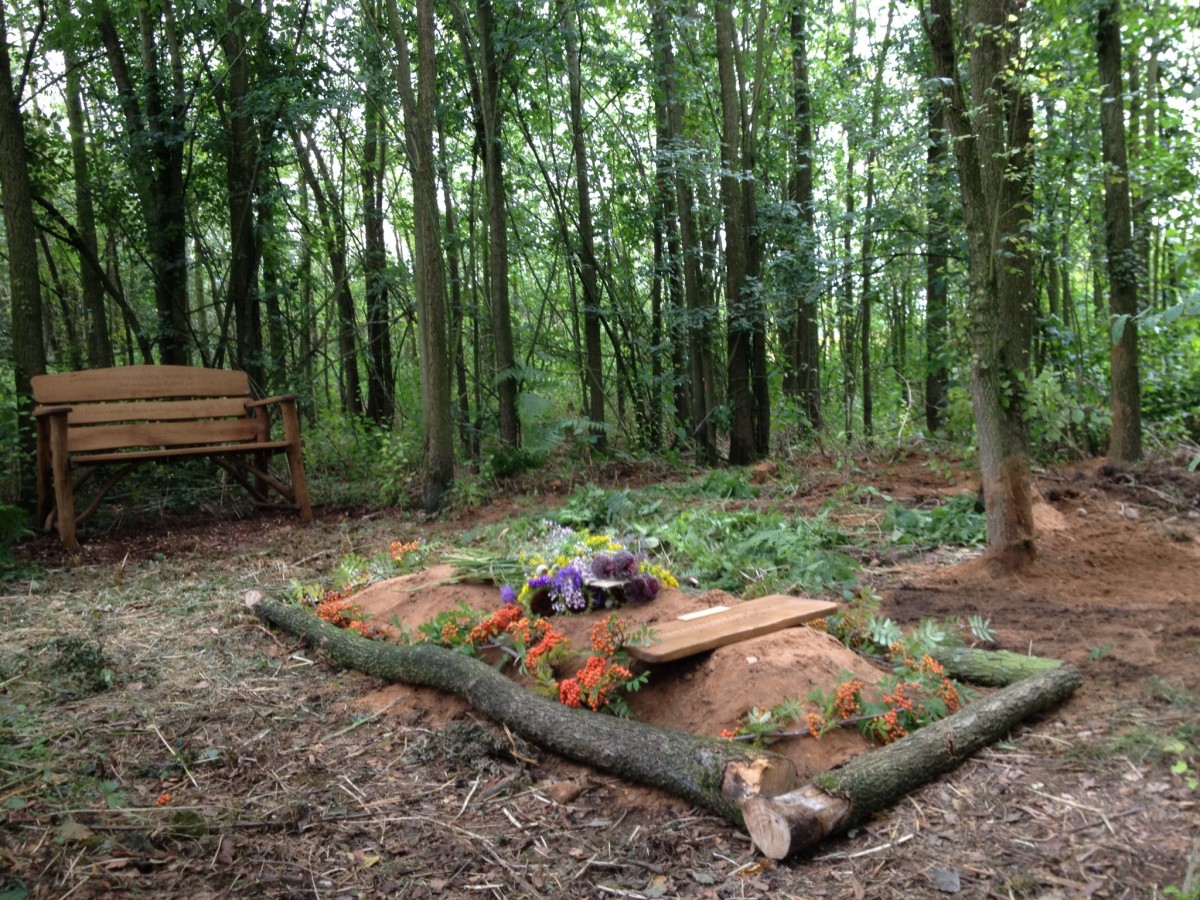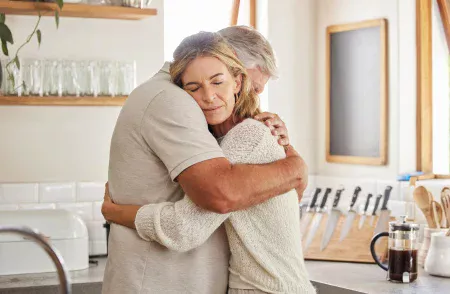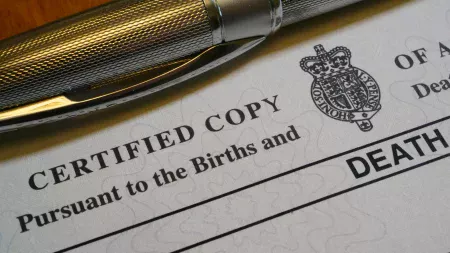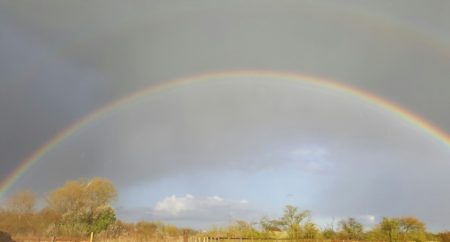At Respect Funeral Services, we are committed to providing meaningful and sustainable ways to honour loved ones.
As environmental consciousness grows, many families are turning to green funerals, particularly woodland burials, as a way to celebrate life while respecting the planet.
But where did these practices originate? This post explores the rich history of natural burials, tracing their roots from ancient traditions to their resurgence in modern green funerals.
We’ll also highlight how our services, direct cremations, direct burials, and woodland green burials, connect to these timeless practices, offering dignified and eco-friendly farewells.
What Is A Natural Burial Ground?
Natural burials, often referred to as green burials or woodland burials, involve laying a loved one to rest in a way that allows their body to return to the earth naturally.
This means avoiding embalming chemicals, using biodegradable shrouds such as Respect Everybody Coffin-Less-Shrouds or eco-friendly coffins, and choosing burial sites that blend seamlessly with the natural landscape, such as meadows or woodlands.
Unlike traditional burials, which may use non-biodegradable materials or concrete vaults, natural burials prioritise environmental sustainability and minimal ecological impact.
The ethos of natural burials is rooted in simplicity and respect for the natural cycle of life and death.
Graves are often shallow to encourage microbial activity / aerobic activity, and instead of headstones, sites may be marked with a flat natural solid Oak tablet or native trees, wildflowers, or simple plaques.
These practices not only reduce environmental harm but also create serene, wildlife-rich spaces for families to visit and reflect.
Why Are Natural Burials Gaining Popularity?
The rise in eco-consciousness has driven demand for sustainable funeral options. They are unhurried and time-rich. Many people who lived with a commitment to environmental stewardship wish to extend this legacy after death.
Natural burials offer a way to honour this ethos, providing a peaceful resting place surrounded by nature. Additionally, green funerals can be more cost-effective than traditional services, as they often involve simpler arrangements and fewer resources.
What We Offer at Respect Funeral Services
At Respect Funeral Services, we provide meadow and woodland green burials as a full-service option, complete with a ceremony set in the beautiful UK countryside.
Our carefully preserved burial grounds offer eternal resting places which will never be disturbed; they are sanctuaries where memories flourish amidst trees and wildlife, creating a living memorial that thrives in harmony with nature.
We also offer direct burials for those seeking a straightforward, eco-friendly option without a ceremony, and direct cremations are Greener Cremations using our unique cremation shrouds so they provide a low-cost, sustainable option followed by laying your loved one’s ashes to rest in one of our parks so you have a place to visit from time to time. For families preferring a simpler farewell, some families may hold on to the ashes for a while but rather than them being placed in a cupboard they can finally be laid to rest in a place they can visit from time to time.
Ancient Origins of Natural Burials
Natural burials are far from a modern invention; they echo practices that date back thousands of years across diverse cultures.
Before the rise of industrialised funeral practices, many societies buried their dead in ways that aligned with the natural world, allowing bodies to decompose organically and nourish the earth.
Prehistoric and Early Human Practices
Archaeological evidence suggests that as early as 60,000 BCE, humans practised simple burials. Neanderthals, for example, buried their dead in shallow graves, sometimes with tools or flowers, indicating respect for the deceased and a belief in the cycle of life.
These burials were practical, using natural materials like earth and stone, and avoided chemical preservation, aligning closely with today’s green burial principles.
Ancient Civilisations and Natural Rites
Many ancient cultures embraced burial practices that prioritised natural decomposition:
- Mesopotamians (circa 3000 BCE) often buried their dead in simple pits or wrapped in reeds, allowing the body to return to the earth.
- Ancient Egyptians, while known for mummification among elites, also practised simpler burials for commoners, placing bodies in shallow desert graves where arid conditions naturally preserved remains.
- Indigenous Cultures across the Americas and Australia buried their dead in harmony with the land, often using biodegradable materials like animal hides or bark. For example, some Native American tribes placed bodies in elevated platforms or shallow graves, allowing nature to take its course.
- Zoroastrian Traditions in ancient Persia used “Towers of Silence,” where bodies were exposed to the elements and scavengers, avoiding soil contamination and reflecting a deep respect for the environment.
Medieval and Pre-Industrial Europe
In medieval Europe, Christian burial practices typically involved wrapping bodies in shrouds and placing them directly in the earth, often in churchyards or communal burial grounds.
Embalming was rare, reserved for nobility or clergy, and most burials were simple, biodegradable, and aligned with natural processes.
These practices closely resemble modern woodland burials, where the focus is on returning to the earth without artificial barriers.
Cultural Significance of Ancient Practices
Across these traditions, natural burials were not just practical but deeply symbolic. They reflected beliefs in the interconnectedness of life, death, and the environment, viewing death as a transition that nourished the earth.
This philosophy resonates with modern green funerals, which seek to honour both the deceased and the planet.
The Shift to Modern Funeral Practices
The move away from natural burials began in the 19th century, driven by industrialisation, urbanisation, and changing cultural attitudes. Several factors contributed to this shift:
The Rise of Embalming
During the American Civil War (1861–1865), embalming became widespread to preserve soldiers’ bodies for transport home.
This practice spread to Europe, particularly in the UK, where it was seen as a way to delay decomposition for viewings or elaborate funerals.
Embalming fluids, often containing formaldehyde, became standard, but they introduced environmental concerns due to their toxicity.
Industrialised Funeral Industry
The Victorian era saw the growth of the funeral industry, with ornate coffins, hearses, and elaborate ceremonies becoming symbols of status.
Non-biodegradable materials like metal caskets and concrete vaults became common, distancing burials from their natural roots.
Cemeteries also became more formal, with manicured lawns and stone monuments replacing wild, natural landscapes.
Urbanisation and Space Constraints
As cities grew, space for burials became limited, leading to the rise of cremation as a practical alternative.
By the late 19th century, cremation gained acceptance in the UK, particularly after the Cremation Act of 1902. But never gained real acceptance until the early 1960s
Whilst cremation reduced land use, it raised environmental concerns due to high energy consumption and emissions, prompting renewed interest in greener alternatives.
Environmental and Cultural Impacts
These modern practices, whilst offering convenience and cultural significance, often came at an ecological cost.
Embalming chemicals can leach into soil, non-biodegradable coffins take centuries to decompose, and cremation contributes to carbon emissions.
This disconnect from natural processes spurred a movement to reclaim eco-friendly burial methods.
The Resurgence of Natural Burials in the Modern Era
The late 20th century marked a turning point, as environmental awareness and a desire for personalised, meaningful farewells fuelled the revival of natural burials. And the pioneer was our friend Ken West who opened the first Green Burial ground in Carlisle in 1993, subsequently being recognised for his contribution to nature and the UK he was honoured with a MBE.
In the UK, this resurgence has been particularly strong, with over 160 dedicated natural burial grounds now in operation. 140 councils offer a green washed version of what they call green burial, BUT they dig using machinery and not by hand, for example.
The Birth of Modern Green Funerals
The UK’s first woodland burial ground, The Woodland Burial at Carlisle Cemetery, opened in 1993, setting a precedent for eco-friendly funerals.
This site offered a model for burials that avoided embalming, used biodegradable coffins, and integrated graves into natural landscapes.
Since then, the number of woodland burial sites has grown, reflecting a broader cultural shift towards sustainability.
Key Features of Modern Natural Burials
Today’s green funerals are defined by several principles:
- Biodegradable Materials: Shrouds and coffins are made from materials such as cardboard, wicker, bamboo, or cotton, ensuring they decompose naturally. At Respect, we offer our unique Respect Family Coffins and EveryBody Shrouds, crafted from natural bamboo and included in our burial services.
- No Embalming: Avoiding chemicals allows the body to decompose naturally, reducing environmental harm.
- Natural Settings: Burial grounds are often woodlands, meadows, or parklands designed to support wildlife and native plants.
- Flexible Ceremonies: Green funerals can be religious, non-religious, or entirely personalised, with no rigid protocol. Families may choose a simple committal, a memory walk, or a full ceremony in a woodland setting.
- Minimal Memorialisation: Instead of headstones, graves may be marked with solid oak plaques or natural stone tablets, all engraved but laid flat to the ground, often native English trees are planted to mark the resting place or wildflowers, preserving the natural aesthetic.
Environmental and Emotional Benefits
Green burials offer significant ecological advantages, such as reduced carbon footprints and the preservation of natural habitats.
They also provide emotional comfort, offering families a serene living memorial where they can reconnect with their loved one in a peaceful setting.
For example, at Respect, families have shared how when visiting our woodland sites, sitting by a loved one’s bench, or hearing birdsong brings solace during grief.
What We Offer at Respect Funeral Services
Our woodland green burials provide a full-service experience, including a ceremony in stunning countryside settings.
We ensure every detail is handled with care from Everybody shrouds to biodegradable coffins to minimise environmental impact.
For those preferring simplicity, our direct burials offer a dignified, eco-friendly farewell without a ceremony, whilst our direct cremations are a Greener Cremation using our unique cremation shrouds so they provide a low-cost, sustainable option followed by laying your loved one’s ashes to rest in one of our parks so you have a place to visit from time to time..
Our team is dedicated to guiding families through these choices with compassion, ensuring a farewell that honours both the deceased and the planet.
How Ancient Practices Inspire Modern Green Funerals
The revival of natural burials is not just a response to environmental concerns but a return to ancient wisdom.
Many modern green funeral practices draw directly from historical traditions:
- Simplicity and Biodegradability: Like ancient shrouds or reed wrappings, today’s biodegradable coffins and shrouds echo the use of natural, decomposable materials.
- Connection to Nature: Ancient cultures buried their dead in harmony with the land, a principle reflected in modern woodland burial grounds that prioritise wildlife and native flora.
- Minimal Intervention: Avoiding embalming and vaults mirrors ancient practices that allowed natural decomposition, viewing death as part of the earth’s cycle.
- Community and Ritual: Many ancient burials involved communal rites, a practice revived in the flexible, personalised ceremonies of modern green funerals.
These connections highlight a timeless respect for the environment and the belief that death can nourish life. At Respect, we embrace this philosophy, ensuring our services reflect both ancient values and modern sustainability.
The Role of Respect Funeral Services in Green Funerals
At Respect Funeral Services, we are proud to lead the way in offering eco-friendly funeral options that honour both tradition and the environment.
Our services are designed to meet diverse needs while prioritising dignity, sustainability, and personalisation.
Our Woodland Green Burials
Our woodland green burials are a cornerstone of our offerings, providing a full-service experience in the beautiful UK countryside.
These sacred spaces are carefully managed to encourage wildlife, with native trees like oak, ash, and cherry underplanted with wildflowers to attract butterflies and birds.
Families can personalise the ceremony, whether it’s a religious service, a non-traditional tribute, or a quiet committal.
Graves are marked with trees or simple plaques, creating a living memorial that blends into the landscape.
We also offer pet burials in our togetherness resting areas, which are fully licensed to reunite both animal lovers and their pets together once more. These joint human-pet sections were established out of demand, reflecting our commitment to inclusive, compassionate care.
Direct Burials and Direct Cremations
For those seeking simplicity, our direct burials provide a dignified, eco-friendly option without a ceremony, using biodegradable coffins or shrouds.
Our direct cremations offer a sustainable alternative, with options for biodegradable urns or scattering ashes and for laying to rest in a natural setting.
Both services are designed to minimise environmental impact while ensuring a respectful farewell.
Why Choose Respect?
Our team, led by experienced funeral directors like Gordon and Alison, both they, and the team are dedicated to supporting families with empathy and professionalism.
We understand the emotional weight of planning a funeral, which is why we offer tailored guidance, from choosing a burial plot to personalising a ceremony.
Our commitment to sustainability is evident in every aspect of our work, from hand-dug graves to eco-friendly coffins.
Families consistently praise our seamless organisation and compassionate approach, noting how our woodland sites provide a “perfect” and “peaceful” resting place.
The Future of Natural Burials
The demand for green funerals is expected to grow as environmental awareness continues to rise.
Innovations like electric cremators powered by renewable energy and water cremation (resomation, not yet available in the UK) are paving the way for even greener options. BUT it took some 60 years or more before cremation became accepted and it has taken just over 30 years for Natural Green Burial & Woodland burials to start to become more accepted and grow in popularity
Meanwhile, the expansion of woodland burial grounds across the UK reflects a cultural shift towards sustainable, meaningful farewells.
At Respect Funeral Services, we are committed to staying at the forefront of this movement, continually refining our services to meet evolving needs.
Whether through expanding our woodland sites or introducing new eco-friendly products, we aim to make green funerals accessible and impactful for all.
Conclusion: Honouring Life and Nature
Natural burials bridge ancient traditions and modern values, offering a way to honour loved ones while nurturing the planet.
From prehistoric shallow graves to today’s woodland sanctuaries, these practices remind us that death can be a natural, life-affirming process.
At Respect Funeral Services, we are proud to carry this legacy forward through our woodland green burials, direct burials, and direct cremations, providing compassionate, sustainable options for every family.
If you’re considering a green funeral, we invite you to explore what we offer at Respect Funeral Services.
Arrange A Natural Burial With Respect
Reach out to us directly by calling 01427 612992 or completing the enquiry form via our contact page here.
Q&A’s For Natural Burials At Respect
Q1. What makes a natural burial different from a traditional burial?
A natural burial, also known as a green or woodland burial, prioritises environmental sustainability by allowing the body to decompose naturally and nourish the earth. Unlike traditional burials, which often involve embalming chemicals, non-biodegradable coffins, and concrete vaults, natural burials use biodegradable materials like pure cotton shrouds produced by Respect’s Everybody shrouds or wicker or bamboo coffins and avoid chemical preservatives. Graves are typically shallow to encourage microbial/aerobic activity, and sites are often in woodlands or meadows, marked with trees or wildflowers instead of headstones. At Respect Funeral Services, we offer woodland green burials in the beautiful UK countryside, providing a full-service ceremony that blends seamlessly with nature, as well as direct burials for a simpler, eco-friendly option.
Q2. Are natural burials more affordable than traditional funerals?
Natural burials can be more cost-effective than traditional funerals, as they often involve simpler arrangements, such as EveryBody Shrouds, biodegradable coffins, and the absence of embalming or elaborate memorials. However, costs vary depending on the burial site, ceremony, and additional services. Meadow plots are the most affordable, whilst Woodland burial grounds may have higher plot fees due to it being harder to dig by hand and their maintenance as wildlife sanctuaries, but the overall simplicity can reduce expenses. At Respect Funeral Services, we offer transparent pricing for our woodland green burials, direct burials, and Greener direct cremations using shrouds instead of coffins, ensuring families receive dignified, sustainable options tailored to their budget.
Q3. Can I personalise a woodland burial ceremony?
Absolutely. Woodland burials offer great flexibility for personalisation, allowing families to create a ceremony that reflects their loved one’s values and beliefs. You can choose a religious, non-religious, or entirely bespoke service, incorporating elements like music, poetry, or a memory walk through the burial ground. At Respect Funeral Services, we work closely with families to design meaningful woodland green burial ceremonies in serene countryside settings. Whether it be planting a native tree, scattering wildflower seeds, or holding a quiet committal, our team ensures every detail honours your loved one’s legacy.
Q4. How do natural burials benefit the environment?
Natural burials significantly reduce environmental impact compared to traditional funerals. By avoiding embalming chemicals, which can leach into soil, and using biodegradable EveryBody shrouds and coffins, they ensure no harmful materials remain in the earth. Shallow graves promote natural decomposition, enriching the soil and supporting plant growth. Woodland burial sites, like those we offer at Respect Funeral Services, are managed to enhance biodiversity, attracting wildlife and preserving native flora. These practices create living memorials that contribute to ecosystems, making natural burials a sustainable choice for those committed to environmental stewardship.
Q5. Can I pre-plan a natural burial for myself or a loved one?
Yes, pre-planning a natural burial is a thoughtful way to ensure your wishes are met and to ease the burden on your family. You can choose meadow or woodland burial plots, specify preferences for the ceremony, and even select a biodegradable EveryBody pure cotton shroud or coffin. Pre-planning also allows you to spread the cost over time. At Respect Funeral Services, we offer guidance on pre-planning our woodland green burials or direct burials, helping you create a sustainable, meaningful farewell. Contact our compassionate team to discuss your options and secure a plot in one of our beautiful countryside burial grounds.
Book A Visitation At One Of Our Burial Parks
North Nottinghamshire & South Yorkshire Burial Park
Lincolnshire & North Lincolnshire Burial Park
Contact Respect Directly
After Care
If you need extra help, there are excellent resources available:
- NHS: The NHS offers advice on coping with bereavement, including mental health support. Visit their page on Dealing with Grief and Loss for practical tips and helpline details.
- Respect: the Respect Guide, What To Do When Someone Dies covers benefits like the Bereavement Support Payment.
- Cruse Bereavement Support: A UK charity dedicated to grief, Cruse provides free counselling and resources. Learn more at cruse.org.uk.





